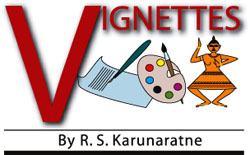|

Miracles of alternative medicine
Health is wealth. When you lose it, you feel miserable. When you
become a patient, you want to recover soon. You go to your family
doctor. When his medicine does not cure you, you go to a specialist.
Sometimes you have to be warded in a hospital.
If you have a medical insurance or to if you can afford the high fees
you can stay in a leading private hospital. Sometimes, even the
so-called specialists fail to diagnose the disease.
When you are desperate to find an effective remedy, your friends
advice you to consult so many other specialists, ayurvedic physicians,
native heaters, homocopaths and numerous others who claim to have a
panacea for all ills. Sometimes you consult a number of quacks who have
no qualifications whatsoever. Naturally, now your disease is much more
complicated than it was at the beginning.
Despite major advances in modern medicine, the medical world today
has realised that there are countless ailments which it cannot handle
with the available methods of treatment. I feel that there is a treasure
house of knowledge in different types of alternative medicines that have
evolved and existed for thousands of years.
I had a brush with a paralytic illness recently. On the advice of my
friends I got myself admitted to a leading private hospital. I came
under the supervision of an eminent neuro surgeon.
After numerous tests, which cost me a fortune, I was told that there
was a blood clot in my brain. But the good doctor assured me that there
was nothing to worry. He said he could have it dissolved without
surgery. I was relieved to hear those words.
After a few days I was able to walk unaided. But there was an
excruciating pain running through the spinal column down to the ankle of
my left leg. The pain became acute when I went to bed. The pain killers
did not have the desired effect. I thought something drastic should be
done.
I rang the veteran dramatist Henry Jayasena and sought his advice.
"This is a simple problem. You go and consult Dr. Upali Pilapitiya who
runs the Pilapitiya Ayurveda Health Resort at Kesbewa, Piliyandala".
Accordingly, I consulted Dr. Pilapitiya and he asked me to take in-house
treatment for two weeks.
Then only I realised that Dr. Pilapitiya is one of Sri Lanka's
pre-eminent practitioners of Ayurveda. He was the director of the
Institute of Indigenous Medicine and the Bandaranaike Memorial Ayurvedic
Research Institute. Later I found out that he was an adviser to the
World Health Organisation and the Asian Development Bank on alternative
medicine.
Within a few days of his treatment the pain vanished but I stayed in
his private hospital for ten days as I was advised to take the full
course of medicine.
Good wine needs no bush. Similarly, Dr. Pilapitiya never advertises
his competence in treating numerous diseases such as chronic headache,
backache, peripheral neuropathy, diabetic neuropathy, fatigue syndrome,
eating disorders, depression, psoriasis eczema, gastritis, flatulence,
arthritis, sinusitis, bronchitis and dyspeptic conditions.
Once Bradma Weerakoon former secretary to the Prime Minister wrote,
"Dr. Pilapitiya, whom I personally know and hold in very high regard, is
internationally renowned for his knowledge and skills in the practice of
Sri Lankan Traditional medicine. He is not only one of the most
dedicated proponents of traditional medicine (Ayurveda) but also
knowledgeable of other forms of medicine as practised in China, Korea
and Japan."
On the eve my discharge Dr. Pilapitiya tells me that despite
globalisation, Sri Lanka has been able to preserve Buddhism in its
pristine purity for more than 2,500 years.
Ayurveda plus indigenous system of medicine have existed in the
island for more than 3,500 years. The indigenous medicine has been
nourished by Ayurveda.
Sri Lanka also has a few other systems of indigenous medicine such as
Siddha medicine which was evolved in Southern India and the Unani system
which has evolved in the Greeko-Arabic region and brought to Sri Lanka
via the Silk Route.
Basically his treatment includes Ayurvedic and traditional medicine
combined with Acupuncture which originated in China. Acupuncture is an
effective treatment for pain and illness in which thin needles are
positioned just under the surface of the skin at special nerve centres
around the body. This is a painless method of treatment.
Dr. Pilapitiya has treated three Heads of State: Mrs. Sirimavo
Bandaranaike, J. R. Jayawardene and R. Premadasa. Mrs. Bandaranaike
honoured him with the prestigious title 'Vishva Prasadini' for his
services. Once he treated Ven. Balangoda Ananda Maithreya Thera and
accompanied him to Burma to take part in the Buddha Jayanthi Sangayana
attended by 2,500 Buddhist monks.
The glorious history of Sri Lanka records a lot of information about
how the kings built and maintained hospitals. For instance, King
Dutugamunu built hospitals in 18 different places and maintained them
using state funds, King Buddhadasa (377-307 BC) was an eminent physician
himself. He built hospitals for the sick and for animals as well.
Dr. Upali Pilapitiya too has two dreams. One is to establish a
college where he could impart his knowledge and experience in
alternative medicine to the younger generation. The other is to put up
an arboretum - a botanical garden devoted to medicinal herbs. He already
has his own factory at Horana which produces all the Ayurvedic medicines
to ISO standards.
"The preparation methods of herbal medicines are very intricate. The
number of herbs which go into a simple compound are numerous. Different
types of leaves, stems and roots are boiled and a selection of oils,
ghee and honey are added in the production of Ayurvedic drugs.
Therefore, the analysis of the end product and its authenticity is a
difficult task," said Dr. Pilapitiya.
When traditional Western medicine fails, people invariably turn to
alternative medicine which includes treatments such as Ayurveda,
acupuncture, homeopathy and hypnotherapy. However, patients should
beware of bogus practitioners who have no qualifications to practise
medicine. |
